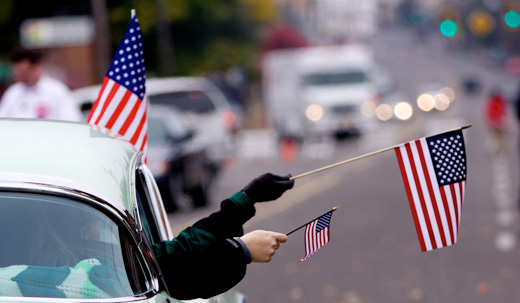
This article was originally published on April 20, 2012.
Last month, a soldier in my old unit who deployed with us to Afghanistan committed suicide. He was only 25 years old. What caused this young man with so much promise to feel that there is no way out?
I personally continue to battle my demons from the war, along with the veterans of wars past. Was he fighting demons like the rest of us? Or did he come home and find the problems he had before he left for war were still waiting for him. Was he having family relationship problems? Did his girlfriend leave him, or did he have nightmares of the war? Did he lose his job, or couldn’t find one, was he one of the thousands of homeless veterans that the average American turns a blind eye to? Did he try to get help and no one listened?
PTSD stands for post traumatic stress syndrome. It has affected thousand of combat and noncombat veterans alike. However, many veterans are afraid to get help, and go undiagnosed and untreated because of the stigma that is attached to the syndrome. PTSD will not go away on its own.
Everyone needs to recognize PTSD and suicidal symptoms, and tendencies. Here is a summary, drawn from PTSD Support Services:
Depression
They feel depressed; “How can I tell my wife, she’d never understand?” they ask. “How can anyone who hasn’t been there understand?”
Accompanying the depression is a very well developed sense of helplessness about one’s condition. In Vietnam, and later in Iraq and Afghanistan, combat held no final resolution for anyone. Regardless of how one might respond, the overall outcome seemed to be just an endless production of casualties with no perceivable goals attained. Regardless of how well one worked, sweated, bled and even died, the outcome was the same. Our GIs gained no ground; they were constantly rocketed or mortared. They found little understanding from their “friends and neighbors” back home, the people in whose name so many went into military service. They returned to the United States, trying to put together some positive resolution of this episode in their lives, but at home they were still hopeless. Why even bother anymore?
Many veterans report becoming extremely isolated when they are especially depressed. Substance abuse is often exaggerated during depressive periods. Self medication as an easily learned coping response; alcohol appears to be the drug of choice.
When someone has a major “attack” of depression they start to think about the value of their lives. How much have they improved the standard of living, upheld family values, felt disappointment in wasting their lives and in many cases where the PTSD has been chronic, felt they have wasted their lives by not reaching a “higher standard of Living” or accomplishment. This is a path to possible suicide. This is where counseling, group therapy, and medications needs to be used! (Understand that when this depression “hits” we are in pain, ended a relationship, lost another job, and we can’t see going on with the same routine. The idea of suicide becomes a tool for an easy out of all the combined pain!)
Isolation
Combat veterans have few friends. Many veterans who witnessed traumatic experiences complain of feeling like old men in young men’s bodies. They feel isolated and distant from their peers. They feel that most of their non-veteran peers would rather not hear what the combat experience was like; therefore, they feel rejected. Much of what many of these veterans have done during the war would seem like horrible crimes to their civilian peers. But, in the reality faced by combatants, such actions were frequently the only means of survival.
Rage
The veterans’ rage is frightening to them and to others around them. For no apparent reason, many will strike out at whoever is near. Frequently, this includes their wives and children. Some of these veterans can be quite violent. This behavior generally frightens the veterans, apparently leading many to question their sanity; they are horrified at their behavior. However, regardless of their afterthoughts, the rage reactions occur with frightening frequency.
Avoidance of feelings: alienation
The spouses of many veterans I have interviewed complain that the men are cold, uncaring individuals. Indeed, the veterans themselves will recount episodes in which they did not feel anything when they witnessed a death of a buddy in combat or the more recent death of a close relative. They are often somewhat troubled by these responses to tragedy; but, on the whole, they would rather deal with tragedy in their own detached way. What becomes especially problematic for these veterans, however, is an inability to experience the joys of life. They often describe themselves as being emotionally dead.
Survival guilt
When others have died and some have not, the survivors often ask, “How is it that I survived when others more worthy than I did not?” Survival guilt is not based on anything hypothetical. Rather, it is based on the harshest of realities, the actual death of comrades and the struggle of the survivor to live. Often the survivor has had to compromise himself or the life of someone else in order to live. The guilt that such an act invokes or guilt over simply surviving may eventually end in self-destructive behavior by the survivor.
Anxiety reactions
Many veterans describe themselves as very vigilant human beings; their autonomic senses are tuned to anything out of the ordinary. A loud discharge will cause many of them to start. A few will actually take such evasive action as falling to their knees or to the ground. Many veterans become very uncomfortable when people walk closely behind them. One veteran described his discomfort when people drive directly behind him. He would pull off the road, letting others pass, when they got within a few car lengths of him.
Intrusive thoughts
Traumatic memories of the battlefield and other less emotion-laden combat experiences often play a role in the daytime life of combat veterans. Frequently, these veterans report replaying especially problematic combat experiences over and over again. Many search for possible alternative outcomes to what actually happened. Many castigate themselves for what they might have done to change the situation, suffering subsequent guilt feelings today because they were unable to do so in combat. The vast majority report that these thoughts are very uncomfortable, yet they are unable to put them to rest.
Such experiences among veterans are rare, but not as uncommon as many may believe. Many veterans report flashback episodes that last only a few seconds. For many, the sound of a helicopter flying overhead is a cue to forget reality for a few seconds and remember Vietnam or Iraq, re-experiencing feelings they had there. It is especially troublesome for those veterans who are still” numb” and specifically attempting to avoid these feelings. For others, it is just a constant reminder of their time in the war, something they will never forget.
In closing, no one knows what drove this young man to this final act. I wish I had been there to listen to him, and tell him I understand.
RIP young soldier, the war is over for you now.
Read more on the symptoms of suicide and combat PTSD here.
Gregory McLaughlin is an Iraq and Afghanistan veteran.
Photo: At the Veteran’s Day Parade, Nov. 11, 2011, in Portland, Ore. Jamie Francis/The Oregonian/AP












Comments